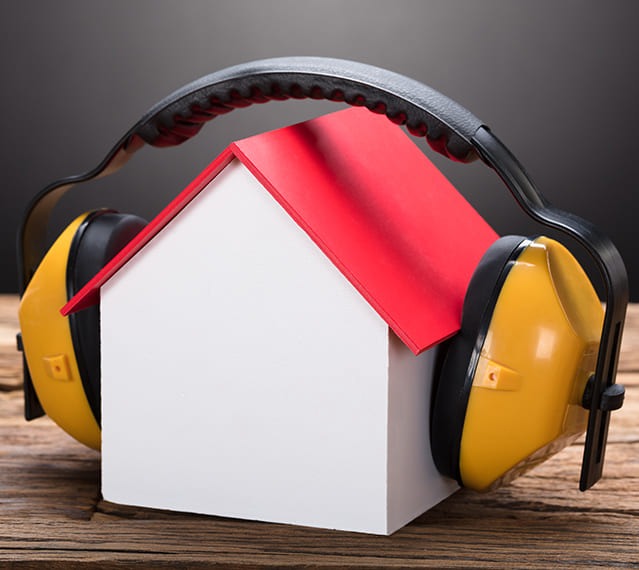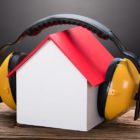When it comes to assessing the acoustic performance of buildings, the terms “sound testing” and “noise testing”, amongst many other names, are often used interchangeably. Whilst they often refer to the same test, there are some nuanced differences between them. Exploring this discrepancy sheds light on the different terminology used within the realm of sound insulation testing.
Understanding Sound Testing:
Sound testing or sound insulation testing refers to the evaluation of sound insulation capabilities within structures, typically buildings. This assessment aims to determine the extent to which airborne and impact sounds are attenuated as they pass through different elements of a building, such as walls, floors, and ceilings. The ultimate goal is to ensure compliance with regulatory standards and to enhance the acoustic comfort of occupants. You can read our more detailed guide to sound insulation testing here
So, what is Noise Testing?:
On the other hand, noise testing encompasses a broader spectrum of assessments related to environmental acoustics. While it includes evaluating sound insulation within buildings, noise testing also extends to measuring ambient noise levels in outdoor environments, monitoring industrial noise emissions, and assessing the impact of transportation noise or noise from music events, for example. Therefore, noise testing encapsulates a more comprehensive analysis of sound and its effects on both indoor and outdoor spaces.
Despite the technical disparities between sound testing and noise testing, these terms are often used interchangeably in colloquial and even professional conversations. This interchangeable usage can lead to confusion, especially for those not familiar with the detailed acoustic terminology. Moreover, regional variations and industry-specific jargon further contribute to the diversity of nomenclature surrounding sound insulation testing.
What other names are used for Sound Insulation Testing?:
Beyond the interchangeability of sound testing versus noise testing, there are many alternative terms used to describe similar assessments. For instance, terms like acoustic testing, soundproofing assessment, pre-completion testing and reverberation analysis are frequently used within specific contexts. Each term may carry slightly different connotations or emphasise distinct aspects of acoustic evaluation, adding to the complexity surrounding the industry.
In conclusion, while sound testing and noise testing are often used interchangeably, they have subtle differences in acoustic evaluation. However, JosTec are here to help. If you need any kind of sound testing services, we can help. Give us a call on 01923 518923 or email us at info@jostec.co.uk and one of our friendly team will be happy to help.
Below are some of the most frequently asked questions related to sound testing…
How many walls will you need to check during the sound test?
As stipulated in Approved Document E, which governs acoustic testing in government building regulations, we are required to conduct sound insulation tests on two walls per dwelling or room intended for residential purposes for up to 10 dwellings or rooms for residential purpose.
What protection do you use to protect the engineer’s ears during the acoustic testing?A)
All of our engineers utilise ear defenders meeting the BSEN 352 standard to safeguard their hearing during sound testing procedures. Additionally, we offer our acoustic testing engineers with annual hearing check-ups to verify that their hearing remains unaffected by the sound testing activities they undertake.
I have a block of 14 flats that I am building but need signing off quickly. How soon can you be on site to carry out the acoustic testing?
Subject to the availability of our sound testing engineers and the project’s location, we generally have a lead time of around 1 week to be able to get to site. This can be sooner in some circumstances. Equipped with cutting-edge technology, our sound insulation testing apparatus allows us to generate and deliver the sound testing report on the very same day.
What information do you require prior to attending the site or providing a quote for sound insulation testing?
To ensure accuracy in providing a quote tailored to your sound testing needs, we typically request detailed and scaled plans of the proposed development. Additionally, written specifications detailing the fabric elements can assist us in defining the scope of work for the sound testing process. Although not mandatory, this additional information is highly beneficial for planning our assessment. Rest assured, we can proceed with the sound testing even in the absence of these specifications.
Why is acoustic testing important as a developer?
Beyond fulfilling the mandatory requirement for Building Regulations approval, sound insulation testing offers other substantial benefits. A property achieving superior sound testing results compared to the standard can deliver a quieter and healthier living environment for its occupants.
Will having sound insulation testing done mean that all the trades on site will be required to down tools for a number of hours? If so,what can you do to help with this while still carrying out accurate acoustic testing?
We are well aware of the struggles that developers have and the pressure they are under to maintain timescales and to complete projects within budget. We are also uncompromising in our adherence to the sound testing requirements that we test under. We are, however, often able to offer flexible timings including weekend and evening acoustic testing in order for there to be minimal disruption to works during our sound insulation testing.



